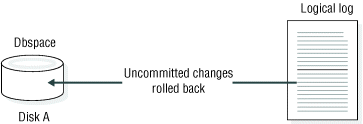The server rolls back uncommitted transactions
After rolling the logical-log records forward, the database server rolls back all logical-log records for transactions that were not committed at the time the system failed. All databases are logically consistent because all committed transactions are rolled forward and all uncommitted transactions are rolled back. Some XA transactions might be unresolved until the XA resource manager is available.
Transactions that have completed the first phase of a two-phase commit are exceptional cases. For more information, see How the two-phase commit protocol handles failures.
Because one or more transactions possibly spanned several checkpoints without being committed, this rollback procedure might read backward through the logical log, past the most recent checkpoint record. All logical-log files that contain records for open transactions are available to the database server because a log file is not freed until all transactions that it contains are closed.
